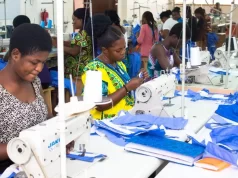By Francis Owusu-Achampong, FCIB
As a banker, anytime I come across the word “warehousing”, my mind races towards diverse forms of collateralization where goods are kept in bonded warehouses as security for various bankers’ advances, like the mechanisms for executing a green clause letter of credit.
So, when I came across the expression, “human warehouses” in reference to the despicable but redeemable conditions of some Ghanaian prisons, I was beside myself with holy rage.
Why should a nation pack human beings in such harrowing conditions when we are not at war with anybody? What has these humiliating conditions got to do with the Russian-Ukraine war that we have conveniently accepted as an excuse for our economic mismanagement?
Many visitors to the Cape Coast castle cry on hearing of church services organized on top of a slave dungeon during the slave trade, where fellow human beings wailed in harrowing conditions before departure to the New World. Such was the height of hypocrisy and man’s despicable treatment of fellow men.
But I dare say, it is not too different from this present era when we witness flamboyant display of official convoys and other highly misplaced expenditure when there are pressing needs to be met in the prisons.
As far as my understanding goes, not all prisoners are criminals. It is not uncommon to find innocent persons in prisons. Did Nkrumah and J.B.Danquah and others ever dream of languishing in jail for trumped-up charges? Even an unintended traffic offence can land anyone in jail. Ex Presidents have found themselves in jail and experienced conditions they never imagined while in power.
I therefore make this solemn plea to the authorities to make prison conditions a lot more habitable. We can and must do it as both moral and social obligations, for as an Akan proverb literally translate,” if the diabolic person knew he would become the ultimate beneficiary of the deer’s head, he would have ensured that it was roasted decently”
We can apply the same alacrity with which we passed the e-levy to overhaul the dehumanizing living conditions of prisoners and stop deluding ourselves that prisons serve as points of reformation for wrongdoers. Indeed, many come out of prisons more hardened than they entered in view of the inhumane conditions they encountered during their incarceration.
We can start the reforms by ensuring the application of more non-custodial sentences, in preference for supervised community service. This is a policy I heard of almost a decade ago but which has suffered implementation hurdles for inexplicable reasons while what we claim to be ceremonial roads are littered with avoidable, humiliating filth.
What stops the Ministries of Local Government and Interior, respectively, from devising schemes by which less hardened prisoners could be deployed to maintain our streets and and choked gutters? Does that infringe on their human rights? Even if it does, is it not preferable to packing them like sardines panting for breath?
Even more importantly, we could get the prisoners into structured large scale agricultural schemes by which they could supplement their nutritional needs while generating incomes for the upkeep of these inmates.
Such schemes appear more laudable to me than the millions of dollars wasted on hosting the African Games and earning a laughable medals haul.
Like ostriches, we continue to behave as if everything is fine with the nation’s finances. Even before we have found time to evaluate the outcome of the last Afcon Games, we are hastening to host the Commonwealth Games that other nations have declined to host for reasons not too different from the predicament we face as a nation.
Do these measures require any rocket science for implementation? Or someone wants to push me into believing that others profit from the agonizing conditions of prisoners or some lucrative waste management contracts will be lost to some faceless capitalists. Or should we conveniently sit back and blame colonialism for this curable mess too?
When the elephants fight, the grass suffer.
Under the current “dumsor” or “dumsiesie” electricity challenges, I know only few people will accept that this is an appropriate time to sympathise with a public official charged with overseeing the supply of uninterrupted power.
However, given that pro LGBTQI+ advocates are breaking our ears with human rights, quoting fake anthropological sources and apologizing for same subsequently, I guess I also have a right to sympathise with any public official at any time.
My sympathy goes to the MD of ECG for the boldness to speak unblemished truth while being interviewed on a television show. When asked why he allowed his men to put off power supply to parliament when proceedings were on-going, he calmly asked the journalist what the parliamentarians were doing at the time.
When the interviewer responded that parliamentarians were working, my admirable MD, who I believe is merely being used as a scape goat in an election year, did not mince words by saying that he and his men were equally doing what they are paid to do. Fantastic answer not tainted with any insult!
Sarcastic as it may appear to some, I doff my hat to him for saying it as it is. If he is not a Vandal, I shall apply on his behalf to be admitted, if that is possible because TRUTH STANDS.
Here is a public official imbued with zeal to execute his functions irrespective of whose ox is gored. Doesn’t parliament have budgetary allocation for the payment of utilities? Do they not have a Facilities Manager or Finance personnel to ensure that they pay their utility charges like every other responsible citizen of the land?
Why should parliament be treated differently from other public and private institutions, including hapless individuals whose power is disconnected for non- payment of electricity bills? It is simply a matter of civic responsibility and a question of prioritization which all must respect.
If every public official worked with the zeal of this MD, we would have been spared of all the ravages of galamsey and the avoidable expenditure of the Ghana Water Company in treating the highly contaminated water for human consumption. A few more selfless and dedicated leaders and this country can move forward. Making him a whipping horse to cover others’ laxity does not solve the current electricity crisis.
Next is the vexed issue of intermittent power outages and the PURC’s fines and ultimatum for ECG to provide a timetable for a structured power cut regime. Some of us find this drama unamusing, seeing that ECG does not produce power by itself. It buys and distributes what power is supplied by other agencies.
If the power producers are unable to supply the quantum of power for ECG to distribute, how do we expect ECG to distribute or even be certain of how much power will be available for distribution at what time, and therefore prepare a timetable anchored on uncertain power generation? It is just like promising to give what you do not have.
Let the authorities, whether technocrats or politicians be bold to admit that there is a generation problem, rooted in financial incapacity, not a big distribution problem in the power sector.
Let the people know that what they are going through is a financial incapacity to purchase adequate crude oil and gas to power the installed generation equipment. It is purely a working capital problem, where generation facilities (fixed assets) are idle for sheer lack of funds to procure adequate crude and gas, respectively to keep the installed equipment running.
Few of us are enchanted by the circus going on about institutions appearing to flex their muscles over who is to blame for the power crisis.
Thanks to the late Prof Mills, even some rural farmers, like me were introduced to Company law at the now UGBS in the late 1980s. We understand the concept of legal entities, separate from their shareholders and directors, the concept of fiduciary responsibilities, principal-agent relationships and lifting the veil of incorporation, among other concepts.
We can only wait with bated breath to find out how this charade of penalties will play out in a court room where ECG directors have been personally levied penalties far in excess of their collective remuneration, even if the law permitted them to remain directors for the next thirty years!
While this concert goes on, consumers of electricity are bombarded everyday with inconsistent, vague reasons why we cannot have sustainable power supply; who is to be blamed, and most importantly, when the solutions will be found to save us from unnecessary definitions of the same absence of power felt in our homes, hospitals and industries.
While trying to contain my disappointment with the energy crisis, I would appeal to the ECG authorities to bring sanity into ECG’s internal operations too. There is credible evidence and widespread belief that some officials of the company are complicit in most of the rot be-devilling the company.
Cases of meter stealing are rampant in New Bortianor in Accra now. My investigations reveal that the thieves, in connivance with unscrupulous ECG officials, are able to re-calibrate the meters and on- sell to other applicants.
This is not a one- off case to be easily ignored, as I am told, it happens regularly in other areas. I would have expected a situation where registered meters could not be used by any other persons than the original purchaser in or outside the jurisdiction of the relative ECG District Office.
My sympathies with State Owned Enterprise Managing Directors
After an earlier article in which I wondered why many state-owned commercial enterprises do not perform to expectation, irrespective of the massive resources at their disposal, one of such Chief executives called me on phone for a nearly one-hour chat.
At the end of the session, I could only sympathise with those who operate under such extreme pressures that are uncommon in the multinational setting.
It all boils down to political interference in the way public entities are subjected to. It starts with the appointing authority and the fact that these appointments are usually ways of thanking some individuals for their roles in bringing a party into power. Implicit in this is the winner takes all philosophy of our current constitutional arrangement.
Many board members are equally selected in line with political referrals and are implicitly precluded from availing their organization of their valuable expertise, unencumbered by political manipulation. Board decisions can hardly be made on strategic economic considerations, irrespective of the collective expertise available.
Invitations to social functions and the unwritten expectations to donate generously alone can drain one of the nominally high emoluments of these officials, hence the quick resort to corruptible tendencies.
Even more daunting is the multitude of calls on the respective CEOs to recruit friends and relations of board members or critical party executives into the firm. The result, in most cases, is that various establishments become overstaffed, sometimes with ill-qualified personnel at the base and middle management. In no time, these people take up the mantle of union leadership to intimidate executives, who must look beyond their shoulders before implementing strategic decisions.
In terms of qualification and experience, though, my now CEO friend boldly asserted that some of them can match their counterparts in other multinational companies.
When asked why they don’t resign on principle, I was told that this is not the kind of economy where obsession with ethics can still pave way for you to survive in readily available alternative jobs.
Besides, most of these officials just love to work in their own countries, having suffocated under veiled racial prejudice in other countries where they performed creditably. To these officials, “ my sympathies”. Let us read about your memoirs as you daily confront the myriad of dilemmas inherent in your desire to live right according to your conscience and the pressures involved in managing public firms in “the third world”.
Road Safety and our priorities
The statistics on Ghana’s vehicular accidents are both frightening and humiliating. There are various factors accounting for this which cannot be exhausted in this piece. While we cannot have absolute control over all the factors, at least, let us deal with road markings on the streets and highways and provide visibility on these roads. Even road markings on so-called ceremonial roads are not visible. Are we that poor or just irresponsible?
The medians on city streets, especially the Awoshie- Pokuase, Circle to Pokuase, Kaneshie- Kasoa roads need not be in such unkempt and deplorable state. Why should we needlessly make driving on these streets so dangerous, especially in the absence of street- lights which we all pay for but cannot enjoy consistently?
Again, can we not deploy less hardened prisoners to tidy up these roads, create some income source for the Prison authorities and earn some respect from visitors to this country? Let us learn to prioritise!
The writer is a Fellow of the Chartered Institute of Bankers, a former adjunct Lecturer at the National Banking College, a farmer and the author of “Risk Management in Banking” textbook. Email; [email protected] Tel. 0244 324181

















